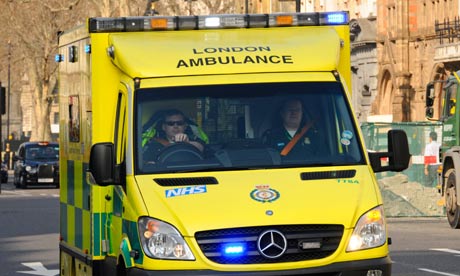
There is a moment halfway through my phonecall with NHS 111 when I start to question what I'm doing. "So," says the woman on the other end of the line. "Shall I go ahead and call an ambulance?" I'm fighting fit but I've rung NHS 111 because I want to know the difference between it and the service it's replacing, NHS Direct. The government wants to phase out the latter – a health advice hotline staffed by nurses – and replace it with the former, a cheaper service staffed mainly by people without extensive medical training. NHS Direct was meant to stop people wasting hospitals' time with minor maladies – but its critics argue still refers too many patients to A&E. It's claimed that non-experts could do the same job, and for less.
In order to put that claim to the test, I've called NHS 111 with a complaint I once presented to NHS Direct. Last year, I had a minor panic attack on the Hammersmith flyover. I'd cycled up it thinking it was a normal road. Pretty soon, I realised it was almost a motorway, and that I was the only cyclist among three lanes of speeding cars. My heart started pounding - perhaps even palpitating - and shooting pains flashed down my left arm. When I got home – after an hour inching along the hard shoulder – I had a moment of absurd hypochondria. I thought I might be about to have a heart attack. I called NHS Direct, who told me I need not worry.
Would NHS 111 be any different? I didn't think it would. I ring with the same story. I actually tone the symptoms down. Last year, I said I was still in pain; today I claim the pain has stopped, and I don't mention the palpitations. Am I bleeding? I'm not. Is my chest hot? No. Does my back ache? No. Breathless? No. The only symptom I have is a shooting pain, which has now stopped. That's when I'm offered an ambulance. I start to argue. She puts me through to a doctor. He underlines his colleague's concerns, vigorously. If I didn't have a heart problem before, I do now.
Eventually, I persuade him my friends will drive me to hospital. Keeping my "symptoms" the same, I call NHS Direct once more, to see how their service differs. Once again, I speak to two call-handlers, the second of whom is a nurse. There's a big difference, though: at no point am I offered an ambulance. Instead, I'm asked a more thorough series of questions. Are my nails white? Is there swelling around my shoulder? How does it feel to move my wrist? Am I feeling clumsy? After this more extensive analysis, the nurse concludes that I should rest, take some ibuprofen, and call again if there's any further problem.
There's a limit to how much two calls can tell us, and some will feel the public interest does not justify wasting the respective nurses' time. But perhaps we can draw two informal conclusions. One: if I really had a heart condition, the NHS 111 handlers, to be fair, would have saved my life. Two: that said, the service NHS 111 offers will be no less of a drain on the emergency services than NHS Direct. But as mentioned in point one, this may be no bad thing.
• This article was corrected on May 30 to add a missing line at the end of the second paragraph.

